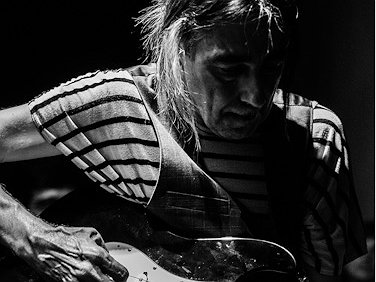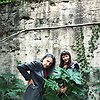When did you start playing your instrument?
My sister taught me how to play guitar. She learned before me and showed me the chords – A, E, G, D, F Sharp Minor, A and E chord tuning, D chord tuning, and barring (although capos were popular then).
What or who were your early passions or influences?
As a teen, blues. All kinds. Especially Muddy Waters and Howlin’ Wolf.
What do you personally consider to be the incisive moments in your artistic work and/or career?
The first time I heard Michael Henderson drop his sound from nowhere, placing each subsequent sound in all the most unexpected places.
When I found out I was ham-fisted and could never be a money-making guitar player.
Keith Rowe once asserted that it is often certain people that “give one permission to do things.” How was that for you – in which way did the work of particular artists before you “allow” you to take decisions which were vital for your creative development?
The painter Mark Rothko made me realize that I could do something minimalistic and yet have it say something vital. I discovered him at age 19, when he was still alive. All of my artistic theories came from art. All of them. I wanted to make music so that people could hear in color, deep tones.
What are currently your main artistic challenges?
The same as always. Same as Keats. Truth.
What do improvisation and composition mean to you and what, to you, are their respective merits?
What’s better than composition?
How important are practicing and instrumental technique for achieving your musical goals?
I don’t practice. I only play. In the 1990s, I used to play and record something every day. These days the guitar rarely comes out of the bag between shows, but I’m still playing all the time. My whole life is music. Everything I do is music.
I have a great love for the physical. I don’t reach for the spiritual – if I reached for that, I wouldn’t get anywhere. I don’t know what spiritual means. But once you understand the physical, everything else falls in place. The notes are physical, the instrument is physical, the eardrums are physical, the motions are physical, the soul is physical. We live in a physical world. Music has to have blood in it.
How do you see the relationship between sound, space and performance?
I’m not sure. I mean, if the acoustics stink, do I skulk around?
I like little bar places. I don’t like big, echoey places. I like people’s houses the best.
Derek Bailey defined improvising as the search for material which is endlessly transformable. Regardless of whether or not you agree with his perspective, what kind of materials have turned out to be particularly transformable and stimulating for you?
You have to play from your own inner light. Your own insides are the most pure, like a field, uncultivated, wild and free. When I’m playing the guitar, I set a little fire going. I don’t ever get in the way of its spread. I just blow on it.
Reportedly, John Stevens of the Spontaneous Music Ensemble had two basic rules to playing in his ensemble: (1) If you can’t hear another musician, you’re playing too loud, and (2) if the music you’re producing doesn’t regularly relate to what you’re hearing others create, why be in the group? What’s your perspective on this statement and how, more generally, does playing in a group compare to a solo situation?
You can hurt a singer’s voice if you play too loud. You can also destroy your own eardrums.
When you play, you have to keep your ears open.



